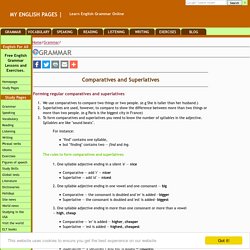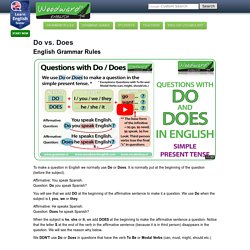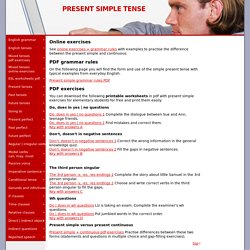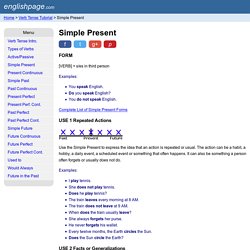

S for housed. Comply Synonyms, Comply Antonyms. WOULD....WOULD LIKE.........WOULD LOVE. Grammar Lessons - Quantifiers. Would. How much / how many. Grammar Lessons - Comparatives and Superlatives. Forming regular comparatives and superlatives We use comparatives to compare two things or two people.

(e.g She is taller than her husband.) Superlatives are used, however, to compare to show the difference between more than two things or more than two people. (e.g Paris is the biggest city in France) To form comparatives and superlatives you need to know the number of syllables in the adjective. Syllables are like "sound beats". For instance: "find" contains one syllable, but "finding" contains two — find and ing. The rules to form comparatives and superlatives: 1. Irregular comparatives and superlatives How to use comparatives and superlatives Similarities To express similarities use the following structure: Examples: Mike is as intelligent as Nancy. Exercises on comparatives and superlatives.
English Grammar - Object Pronouns. Mis archivos guardados en SlideShare. Verbes irréguliers anglais - 30 verbes irréguliers de base - Grammaire anglaise. English Irregular Verbs. Do vs Does English Grammar Notes Questions - Preguntas con Do y Does en inglés Gramática. To make a question in English we normally use Do or Does.

It is normally put at the beginning of the question (before the subject). Affirmative: You speak Spanish.Question: Do you speak Spanish? You will see that we add DO at the beginning of the affirmative sentence to make it a question. We use Do when the subject is I, you, we or they. Affirmative: He speaks Spanish.Question: Does he speak Spanish? When the subject is he, she or it, we add DOES at the beginning to make the affirmative sentence a question.
We DON'T use Do or Does in questions that have the verb To Be or Modal Verbs (can, must, might, should etc.) Word Order of Questions with Do and Does The following is the word order to construct a basic question in English using Do or Does. *Verb: The verb that goes here is the base form of the infinitive = The infinitive without TO before the verb. Remember that the infinitive is the verb before it is conjugated (changed) and it begins with TO. Examples of Questions with Do and Does: Professor Charlie - Education. Cultural and educational films and photos. Prepositions of place in English. PRESENT SIMPLE INTERROGATIVE. Present Simple - Online Language Quiz. Present simple tense exercises, printable worksheets pdf. Online exercises PDF grammar rules PDF exercises You can download the following printable worksheets in pdf with present simple exercises for elementary students for free and print them easily.

Do, does in yes | no questions Do, does in yes | no questions 1 Complete the dialogue between Sue and Ann, teenage friends.Do, does in yes | no questions 2 Find mistakes and correct them.Key with answers A Don't, doesn't in negative sentences Don't, doesn't in negative sentences 1 Correct the wrong information in the general knowledge quiz.Don't, doesn't in negative sentences 2 Fill the gaps in negative sentences.Key with answers B The third person singular The 3rd person -s, -es, -ies endings 1 Complete the story about little Samuel in the 3rd person singular.The 3rd person -s, -es, -ies endings 2 Choose and write correct verbs in the third person singular to fill the gaps.Key with answers C Wh questions Do | does in wh questions Liz is taking an exam.
Simple Present. [VERB] + s/es in third person Examples: You speak English.

Do you speak English? You do not speak English. Complete List of Simple Present Forms USE 1 Repeated Actions Use the Simple Present to express the idea that an action is repeated or usual. I play tennis. USE 2 Facts or Generalizations The Simple Present can also indicate the speaker believes that a fact was true before, is true now, and will be true in the future. Cats like milk. USE 3 Scheduled Events in the Near Future Speakers occasionally use Simple Present to talk about scheduled events in the near future. The train leaves tonight at 6 PM. USE 4 Now (Non-Continuous Verbs)